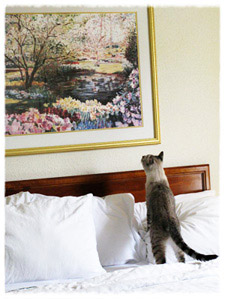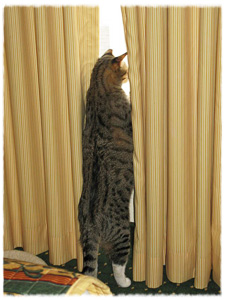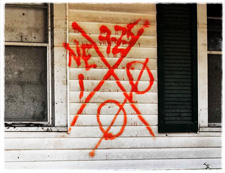![]()
![]()
![]()
![]()

![]()
![]()

![]()
![]()
INTRO
A Call to Readiness
PART TWO
PART THREE
Checklist Before Leaving
PART FOUR
A Carefully Planned Route
PART SIX
Evacuation Resources

![]() BACK TO
BACK TO
![]() View
from a Canary Perch
View
from a Canary Perch

![]()
Diane Dees' cat Ziggy Stardust
takes an interest in the hotel art during evacuation from Hurricane Gustav.

![]()
Dees' cat Tarzan checks out the pool and
sports court from their hotel room during evacuation
from Hurricane Gustav.

WWwRe-Entry | Near
Magic
New Orleans photographer Will Crocker casts a lyrical
eye on the woes and the wonders of returning to New Orleans post-evacuation.
![]() • Read
it here •
• Read
it here •
These are the abbreviated evacuation stories of some of the people who infuse New Orleans with the joy and imagination we all associate with it.
Paul Poché
Evacuated to a
plantation outside of St. Francisville, Louisiana, with 25 friends & 15 cats & dogs.
He and one other friend volunteered to be the cooks – a lucky arrangement if
you are familiar with Mr. Poché's culinary skill – and Paul said that it gave
him a service to focus on, which helped him adapt to the situation. Another bit
of luck: a few of his fellow evacuees received federal emergency funds almost
right away, so this money became the shared resource which paid for everyone's
food. Meanwhile, back in New Orleans, Paul's brother had decided not to evacuate
so he stayed at Paul’s
house. For awhile, the neighborhood was being ransacked by thieves, and Paul’s
brother had a lot of guts and a few guns, so he initiated a vigilante group of
neighborhood protectors, and their stories were too gruesome to tell here. However,
Paul’s
house wasn’t
robbed while he away! Staying at a plantation or other large house far away from
the disaster area with many friends while your house is being defended by the neighborhood
equivalent of a Spanish Armada: Highly Recommended.
Bonnie Noonan
Said the most valuable thing she remembered to
take was her friend Manina, who intended to stay in New Orleans through the hurricane.
If she hadn't, she would’ve died because her house was destroyed. Bonnie’s
house was so severely damaged that she couldn’t move back in, so she spent
eight months of her evacuation in a convent. Staying
in a convent during an evacuation: Highly Recommended.
![]() • READ
HERE •
• READ
HERE •
Bonnie
Noonan's moving essay about her reluctant and untimely departure from New Orleans
during the Katrina evacuation.
George Berke
George is the art director for the major metro newspaper
of New Orleans, The Times-Picayune. Since the news must go on, the staff was
asked for volunteers to keep covering and producing the news. George and several
of his colleagues volunteered for this arduous job, and they were given a “barracks” in
Baton Rouge where they set up computers and housing, and generated the paper
online from there. Intrepid reporters among these volunteer staffers covered
the news in and around New Orleans during the disaster. Some of them later won
Pulitzer Prizes for these efforts. Their online newspaper arose during that time
as one of the very best in the nation, and because of forums they set up for
individual neighborhoods, many people were able to be reconnected with family
and friends whose location –and fate– had been unknown after the
storm. Being a journalist and staying in quarters near the disaster site
with many other people during evacuation: Recommended only for those who are
adventurous, hardy and persevering.
Melanie Miranda
Being friends with your neighbors might end up being a
big help during an evacuation. Melanie’s neighbor decided to stay and ride out the hurricane, so he kept
an eye on Melanie’s house while she was away on an evacuation trek that
included several stops with relatives and friends. Her neighbor even kept her
generator going so that the refrigerator would stay on. Melanie’s brother
Dennis worked at New Orleans Charity Hospital and decided to stay; their mother
made the decision to stay at the hospital with him. This turned out to be a disastrous
decision, because some of the worst human suffering took place in the hospitals
since there was no power, water or food. However, Melanie’s mother made
a worthy installment on her sainthood, because she selflessly and kindly tended
to many dying people during this time. Hospitals as a refuge during evacuation:
Not Recommended.
Alida Glass
You may THINK you’re planning to evacuate with your
family members or your best friends, but who you actually end up evacuating with
might be surprising – like a next door neighbor or someone down the street
who you don't know very well. Alida’s evacuation path was circuitous, including
several stops at a variety of different friends' and relatives' houses. Reception
to her plight as an evacuee was mixed – some welcoming and sympathetic, others
less so. The worst part of it, though, was the thought of her cat who was left
behind. While she was away during evacuation, her house was occupied by vandals
who trapped her cat in the basement. Fortunately, the cat survived. A
meandering road trip during evacuation with a cast of surprise characters: Not
Necessarily Recommended. Leaving your pet during evacuation: Regrettable.
Will Crocker
We booked a room at a motel right on the beach at Gulf
Shores, Alabama. Martha’s
brother and family left later in the day and met us there. The next morning
I answered a phone call from Martha’s brother, Robin at a few minutes before
5:00. He was frantic to leave and drive inland. Martha and I insisted
on staying until we had a reservation somewhere. We made a reservation
in Columbiana, Alabama. When we got on the road it was not crowded
from Mobile north along 65. We stopped in Montgomery at The
Capitol Inn. It
was around noon on Sunday, the parking lot was filled and there seemed to be
commotion in the lobby. We got to the front desk and were amazed that there
were vacancies. All of the activity was people attending the buffet of
fried chicken, collard greens, candied sweet potatoes, corn bread, macaroni,
and sweet tea. The buffet was incredible and the people of Montgomery were
very kind. I called Columbiana and cancelled the earlier reservation. The Capitol
Inn was a relic from better days, but they did have WiFi. The two brothers that
owned the place also had ran a bar they named the Goat Hill Tavern. Every
afternoon they ordered pizza which was freely shared with guests. We hung
out there often Staying at a motel with a popular
restaurant: Highly Recommended.
Diane Dees
During the Katrina evacuation, we stayed at the historic
Bailey Hotel in Bunkie, Louisiana. We chose it because there were vacancies.
At first, we were told we could not bring our pets. We called back--presenting
a very persuasive argument--and we were told we could bring our cats. For the
Gustav evacuation, we stayed at a Residence Inn just outside Birmingham; it is
one of the few hotels that permits pets to stay without charging excessive fees
or limiting the number of pets (by that time, our cat population had changed
from two to four). Tip: If you do an Internet search and see lists for hotels
that allow pets to stay, do not assume that hotel will take all of your pets,
or that that hotel will not charge a lot of extra fees. We were very lucky. The
hotel staff in both places were extremely kind and helpful, and we will never
forget them. Staying
at a pet-friendly hotel: Highly Recommended.
The Bailey didn’t have wireless or high-speed (and there was no wireless
in Bunkie), so we had to use dial-up (a lot of places have only dial-up). I tried
every imaginable configuration and couldn’t get it to work. We asked a
hotel staff member for help, but she was so clueless, she sent us a DSL cable.
However, my husband had the insight to make an educated guess about changing
a prefix digit, based on the hotel phone. He was right. During Katrina, I was
so busy blogging and checking news, I developed a repetitive motion injury from
over-using the touchpad. Traveling with a notebook computer: Back then (during
Katrina)--before wireless cards were built into notebooks--I always took my
wireless adapter, just in case I got lucky or the hotel connection didn’t
work and I had other access. During the evacuation for Hurricane Gustav in 2008,
we had high-speed Internet access in our suite.
![]()
![]()